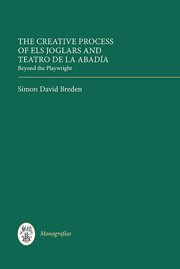8 - Holy Theatre
from Part II - Teatro de la Abadía
Published online by Cambridge University Press: 05 April 2014
Summary
The reappropriation of spaces and their conversion into theatres is not a new phenomenon: in Spain, the Mercat de les Flors in Barcelona and the Teatre Lliure both took over existing structures, the former a market and the latter a workers' cooperative. Perhaps the first thing you notice on arriving at the Abadía theatre is that it is indeed a small church, a fact that must shape how the audience perceive the space and inform their preconceptions to some extent, so that the sense of enacting a ‘holy’ ritual becomes inevitable. The Abadía's methods and ethos create a distinct immersive theatrical experience for its audiences that taps into the ritualistic texture of the building.
The significance and impact of location on performance has become an increasingly important area of study, as Alan Read indicates: ‘A spatial analysis is important to begin to take the specifics of place, rather than the idealised empty space, seriously’ (Read, 1995: 159). Marvin Carlson's Places of Performance gives many indications on how to create a semiotic reading of a space in order to measure how the audience then engage with the performance: ‘We are now at least equally likely to look at the theatre experience in a more global way, as a sociocultural event whose meanings and interpretations are not to be sought exclusively in the text being performed but in the experience of the audience assembled to share in the creation of the total event’ (Carlson, 1989: 2). His study goes on to look at how performance has been conditioned by the circumstances of its location, identifying how audiences would have been aware of the wider context of the event. This is an inevitable part of the experience of visiting the Abadía.
- Type
- Chapter
- Information
- The Creative Process of Els Joglars and Teatro de la AbadíaBeyond the Playwright, pp. 209 - 222Publisher: Boydell & BrewerPrint publication year: 2014



